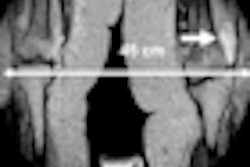
NEW YORK (Reuters Health), Jul 31 - After total knee arthroplasty (TKA) for osteoarthritis of the knee, obese patients fare nearly as well as their normal-weight peers, a British research team reports in the July 24 online issue of the Annals of the Rheumatic Diseases.
"At least one National Health Service trust in the U.K. has been reported to apply a policy that TKA should not be offered to patients with a body mass index (BMI) > 30 kg/m²," Dr. Cyrus Cooper, at the University of Southampton, and associates write. "However, it does not necessarily follow that patients who are obese will benefit less from TKA than others."
The investigators' original study included patients ages 45 years and older who were placed on a waiting list for TKA because of primary knee osteoarthritis from 1995 to 1997, and a control group selected from the general population matched for age, sex, and general practice.
To ascertain long-term outcomes, Cooper's group recontacted 325 surgical cases approximately six years later (range = two to eight years) and 363 nonsurgical control subjects. Average age at follow-up was 70 years.
At baseline, physical function was markedly worse in the patient group than in the controls (mean score 20 versus 89, p < 0.001). However, at follow-up, physical function scores had improved by six points, while that of controls had worsened by 14 points (p < 0.001).
In the subgroup of subjects with baseline BMI > 30, median physical function score increased by three points among the 108 patients, while deteriorating by 36 points among the 36 controls.
Cooper's team also evaluated outcomes among subjects who were older than 75 years at baseline. Physical function scores were unchanged at follow-up among 82 patients, whereas there was a substantial decline of 40 points among the 87 controls.
"TKA halts the decline and maintains physical function up to the oldest age groups," they conclude.
Improvement in physical function following surgery tended to be superior in those with more severe radiological changes in the knee and worse in those with pain in other joints.
"Higher BMI should not be a contraindication to TKA," Cooper and his group advise, "provided that the patient is sufficiently fit to undergo the short-term rigors of surgery."
Ann Rheum Dis 2008.
Last Updated: 2008-07-29 9:46:51 -0400 (Reuters Health)
Related Reading
Meniscus damage contributes to cartilage loss in knee osteoarthritis, March 10, 2006
Copyright © 2008 Reuters Limited. All rights reserved. Republication or redistribution of Reuters content, including by framing or similar means, is expressly prohibited without the prior written consent of Reuters. Reuters shall not be liable for any errors or delays in the content, or for any actions taken in reliance thereon. Reuters and the Reuters sphere logo are registered trademarks and trademarks of the Reuters group of companies around the world.


















